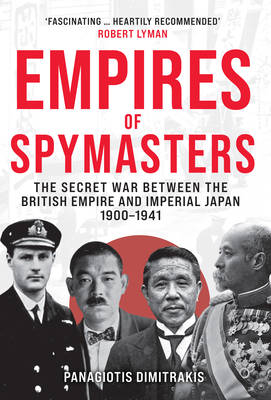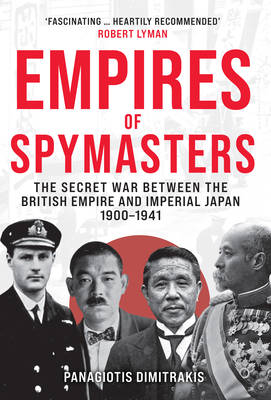
Bedankt voor het vertrouwen het afgelopen jaar! Om jou te bedanken bieden we GRATIS verzending (in België) aan op alles gedurende de hele maand januari.
- Afhalen na 1 uur in een winkel met voorraad
- In januari gratis thuislevering in België
- Ruim aanbod met 7 miljoen producten
Bedankt voor het vertrouwen het afgelopen jaar! Om jou te bedanken bieden we GRATIS verzending (in België) aan op alles gedurende de hele maand januari.
- Afhalen na 1 uur in een winkel met voorraad
- In januari gratis thuislevering in België
- Ruim aanbod met 7 miljoen producten
Zoeken
Empires of Spymasters
The Secret War Between the British Empire and Imperial Japan, 1900-1941
Panagiotis Dimitrakis
Hardcover | Engels
€ 32,45
+ 64 punten
Omschrijving
'The Empire is the Master [in the Far East] and they are the guests, ' Yamagata Aritomo, the chief imperial strategist of Tokyo, once remarked. From the early 1900s, Imperial Japan aimed for hegemony in the Far East. The resourceful and independent-minded Japanese spymasters focused on acquiring intelligence of advanced naval and aviation technology. In London, the War Office and the Foreign Office opted for an alliance treaty with Japan. Nonetheless strategists soon realized that Tokyo was antagonizing Britain in the Far East. The British Empire was deemed weak and overextended. Officials assumed that avoiding confrontation with Japan was the only choice. Britain condoned Japanese aggression in China. Indeed, pro-Japanese bias influenced official policy at the highest levels. Only the spymasters of the Secret Intelligence Service, the Admiralty and the Security Service, recruiting spies in Japan and the Far East, unveiled the Japanese hostile intent against the British Empire.
Specificaties
Betrokkenen
- Auteur(s):
- Uitgeverij:
Inhoud
- Aantal bladzijden:
- 288
- Taal:
- Engels
Eigenschappen
- Productcode (EAN):
- 9781398124370
- Verschijningsdatum:
- 1/01/2026
- Uitvoering:
- Hardcover
- Formaat:
- Genaaid
- Afmetingen:
- 156 mm x 234 mm
- Gewicht:
- 614 g

Alleen bij Standaard Boekhandel
+ 64 punten op je klantenkaart van Standaard Boekhandel
Beoordelingen
We publiceren alleen reviews die voldoen aan de voorwaarden voor reviews. Bekijk onze voorwaarden voor reviews.









